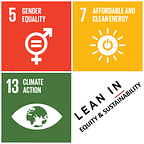I am not my sister’s keeper. I am my sister (Part 1)
Context: Women & Energy (“I am not my sister’s keeper, I am my sister”: exploring the different focus points for women in energy; from under-representation in the industry to access to energy, and how our human energy flows are an opportunity to lean in on the path to SDGs 5 & 7. Recognising and highlighting women’s power to lean in and empower each other as we power the world)
Author: Rosie Chabva
Dear Reader, (Part 1)
Working-age women make up 50% of the world population[1], yet unfortunately, our female face represents the unpleasant side of an industry that is supposed to enable progress. Women are underrepresented and underpaid in the energy industry[2][3].
As energy consumers, women in the global south are caught in the gender-poverty-energy nexus, where women are more likely to suffer the consequences of inefficient and hazardous energy[4].
Older women living alone are more likely to suffer energy poverty due to low income and high energy costs in the global north. With this gloomy reality in mind, the challenge of women and energy can appear overwhelming. So, what can we do about this seemingly insurmountable task?
Organisations like Lean In Equity & Sustainability thus have one mission: to “help women achieve their ambitions and help companies build inclusive workplaces where women of all identities are supported and empowered.”.
Enabling and empowering women to work creates ripple effects that benefit their communities[5]. We, therefore, need to provide women with the right kind of energy to enable them to thrive.
“Ok?” you ask; “how can my energy transform into an enabler for fellow women and allies?”
My light bulb moment came when I discovered the statement, “I am not my sister’s keeper. I am my sister!” In our efforts to enable and empower women to work, I started to wonder what if we embraced this energy of empathy, “the ability to understand and share the feelings of another”?
Studies have shown that going beyond sympathy, “an observation and acceptance that someone else is going through a challenging situation” to empathy are much more likely to result in action[6].
Being a keeper separates us, but the “I am because you are” approach inspires urgency of action because our success becomes incumbent on one another. This paves the way for sustainable, impactful actions as each individual effort combines in the sisterhood to create change for all of us.
Following the Lean In Equity & Sustainability mission, we can transform our energy to positive outcomes for women through our communities and circles.
Ike bu nke anyi; Simba nderedu; Le pouvoir est en nous; Makten er var; Amandla ngawethu,
THE POWER IS OURS!
https://www.linkedin.com/in/rosie-chabva/
[1] The World Bank (2020). Population Data
[2] IEA (2020). Gender diversity in energy: what we know and what we don’t know
[3] Pinsent Masons (2021). Bonus pay gap in energy sector significant, gender pay gap reporting shows
[4] Batchelor, S., Clancy J.S. and Skutsch, M. (2013). The Gender-Energy-Poverty Nexus
[5] UN Women (no date). Facts and Figures: Economic Empowerment
[6] Kramer, B (2018). The Critical Difference Between Sympathy and Empathy
